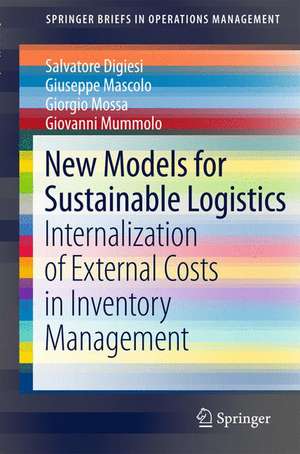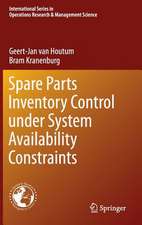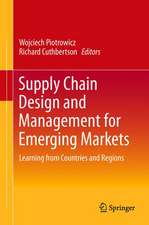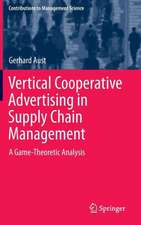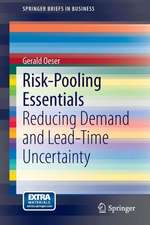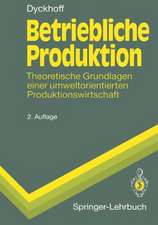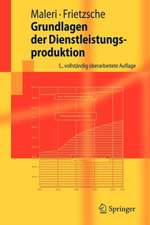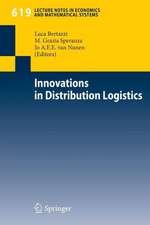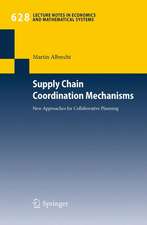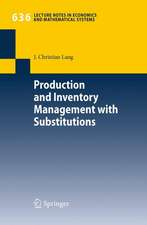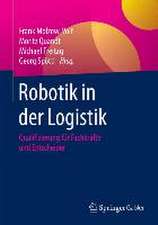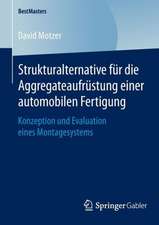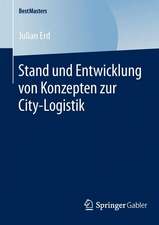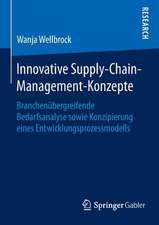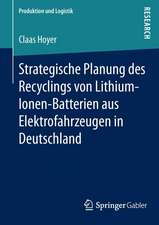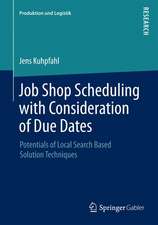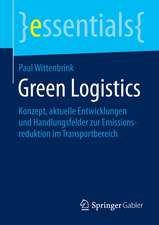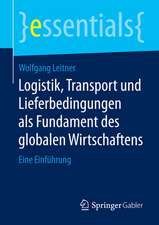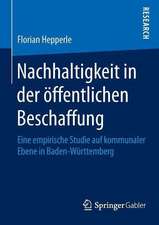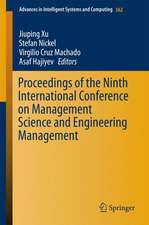New Models for Sustainable Logistics: Internalization of External Costs in Inventory Management: SpringerBriefs in Operations Management
Autor Salvatore Digiesi, Giuseppe Mascolo, Giorgio Mossa, Giovanni Mummoloen Limba Engleză Paperback – 14 aug 2015
New Models for Sustainable Logistics: Internalization of External Costs in Inventory Management is comprised of three chapters. Chapter 1 provides a taxonomy of external costs figures as well as data set enabling the reader to perform reliable estimates of freight transport external costs. To this purpose, a full scale case study is developed. Chapter 2 describes a new sustainable inventory management model whose cost functions include externalities. The classical ‘Economic Order Quantity’ model is re-formulated and the new concept of Sustainable Order Quantity (SOQ) is defined. Finally, in Chapter 3 the SOQ model is formulated for different inventory management applications referred to both deterministic and stochastic production environments. Numerical examples are also provided.
Preț: 355.07 lei
Nou
Puncte Express: 533
Preț estimativ în valută:
67.95€ • 70.68$ • 56.10£
67.95€ • 70.68$ • 56.10£
Carte tipărită la comandă
Livrare economică 11-17 aprilie
Preluare comenzi: 021 569.72.76
Specificații
ISBN-13: 9783319197098
ISBN-10: 3319197096
Pagini: 98
Ilustrații: XIII, 98 p. 30 illus., 4 illus. in color.
Dimensiuni: 155 x 235 x 10 mm
Greutate: 0.24 kg
Ediția:1st ed. 2015
Editura: Springer International Publishing
Colecția Springer
Seria SpringerBriefs in Operations Management
Locul publicării:Cham, Switzerland
ISBN-10: 3319197096
Pagini: 98
Ilustrații: XIII, 98 p. 30 illus., 4 illus. in color.
Dimensiuni: 155 x 235 x 10 mm
Greutate: 0.24 kg
Ediția:1st ed. 2015
Editura: Springer International Publishing
Colecția Springer
Seria SpringerBriefs in Operations Management
Locul publicării:Cham, Switzerland
Public țintă
ResearchCuprins
Internalization of external costs of freight transport.- Sustainable inventory management.- SOQ Model Formulations.
Notă biografică
Salvatore Digiesi. Graduated in Mechanical Engineering at the Polytechnic of Bari - Italy. European PhD in “Advanced Production Systems” at the Interpolitecnica School of Doctorate. Tenured assistant professor of mechanical plants at the Polytechnic of Bari. Member of the Board of Professor of the PhD Course on “Mechanical and management engineering” at the Polytechnic of Bari. His main research topics are sustainable production and logistics, human performance modelling, and energy recovery systems from biomasses.
Giuseppe Mascolo got his Master's degree in Mechanical Engineering in 2011 at the Polytechnic of Bari and the Second Level Master’s Degree in “Industrial Plant Engineering and Technologies” in 2012 at the University of Genoa, both with full marks. He is pursuing his PhD in “Mechanical and Management Engineering”, with a focus on Sustainable Logistics, at the Department of Mathematics, Mechanics and Management (DMMM) of the Polytechnic of Bari.
Giorgio Mossa. He earned the Degree in Mechanical Engineering and the PhD in “Advanced Production Systems Engineering” at the Polytechnic of Bari. He got a master in “Energy and Environmental Management and Economics” at the School “E. Mattei” – ENI Corporate University. In 2014 he earned the National Scientific Qualification for the University Associate Professor position. Tenured assistant professor of operations management and industrial systems engineering and member of the Board of the PhD Course on “Mechanical and management engineering” at the Polytechnic of Bari. Main research topics are environmental management of production systems, human performance modelling, design and management of industrial systems, risk, safety and security management.
Giovanni Mummolo is full professor of graduate and post-graduate industrial engineering courses at the Polytechnic of Bari (Italy), Dept. of Mechanics, Mathematics, andManagement.
His main fields of research are in production management and system design. He is responsible for several international research projects and is referee of many international journals. Research Award of the CIO 2014 – ICIEOM – IIE International Conference. He is President of the European Academy for Industrial Management.
Giuseppe Mascolo got his Master's degree in Mechanical Engineering in 2011 at the Polytechnic of Bari and the Second Level Master’s Degree in “Industrial Plant Engineering and Technologies” in 2012 at the University of Genoa, both with full marks. He is pursuing his PhD in “Mechanical and Management Engineering”, with a focus on Sustainable Logistics, at the Department of Mathematics, Mechanics and Management (DMMM) of the Polytechnic of Bari.
Giorgio Mossa. He earned the Degree in Mechanical Engineering and the PhD in “Advanced Production Systems Engineering” at the Polytechnic of Bari. He got a master in “Energy and Environmental Management and Economics” at the School “E. Mattei” – ENI Corporate University. In 2014 he earned the National Scientific Qualification for the University Associate Professor position. Tenured assistant professor of operations management and industrial systems engineering and member of the Board of the PhD Course on “Mechanical and management engineering” at the Polytechnic of Bari. Main research topics are environmental management of production systems, human performance modelling, design and management of industrial systems, risk, safety and security management.
Giovanni Mummolo is full professor of graduate and post-graduate industrial engineering courses at the Polytechnic of Bari (Italy), Dept. of Mechanics, Mathematics, andManagement.
His main fields of research are in production management and system design. He is responsible for several international research projects and is referee of many international journals. Research Award of the CIO 2014 – ICIEOM – IIE International Conference. He is President of the European Academy for Industrial Management.
Textul de pe ultima copertă
This book introduces new inventory models to support decision-making when cost of externalities are jointly considered along with costs of logistics. Internalization of cost of externalities gives rise to new logistics costs estimates and functions which managers, researchers, lecturers and students should refer in facing with logistics issues. This book focuses on freight transports of industrial production systems. Logistics play a key role for industries since it reveals a critical function designed and managed to pursue economic goals. A large amount of literature is available providing models, which can be used to minimize logistic costs. However, these models usually neglect externalities.
New Models for Sustainable Logistics: Internalization of External Costs in Inventory Management is comprised of three chapters. Chapter 1 provides a taxonomy of external costs figures as well as data set enabling the reader to perform reliable estimates of freight transport external costs. To this purpose, a full scale case study is developed. Chapter 2 describes a new sustainable inventory management model whose cost functions include externalities. The classical ‘Economic Order Quantity’ model is re-formulated and the new concept of Sustainable Order Quantity (SOQ) is defined. Finally, in Chapter 3 the SOQ model is formulated for different inventory management applications referred to both deterministic and stochastic production environments. Numerical examples are also provided.
New Models for Sustainable Logistics: Internalization of External Costs in Inventory Management is comprised of three chapters. Chapter 1 provides a taxonomy of external costs figures as well as data set enabling the reader to perform reliable estimates of freight transport external costs. To this purpose, a full scale case study is developed. Chapter 2 describes a new sustainable inventory management model whose cost functions include externalities. The classical ‘Economic Order Quantity’ model is re-formulated and the new concept of Sustainable Order Quantity (SOQ) is defined. Finally, in Chapter 3 the SOQ model is formulated for different inventory management applications referred to both deterministic and stochastic production environments. Numerical examples are also provided.
Caracteristici
Introduces new inventory models to support decision-making when cost of externalities are jointly considered along with costs of logistics Looks at the social and environmental costs that have to be considered in the framework of sustainable manufacturing Includes case studies on sustainable inventory management as well as new passenger cars distribution in Europe
